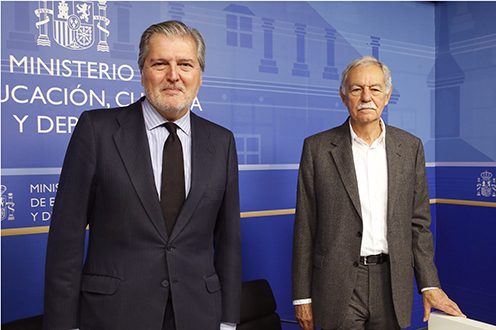Awarded by the Ministry of Education, Culture and Sport, together with 125,000 euros
Sergio Ramírez, awarded Cervantes Prize 2017
News - 2017.11.16
According to its decision, the panel awarded the prize to Sergio Ramírez "for combining prose and poetry and the rigor of the observer and the actor into his work, as well as for reflecting the vividness of daily life by converting reality into a work of art; all with exceptional literary skill and in a variety of genres, such as storytelling, novels and journalistic column-writing".
The panel
The panel consisted of: Darío Villanueva, representative from the Spanish Royal Academy, who also acted as Chairman; Eduardo Mendoza, author and recipient of the award in 2016; Beatriz Vegh, member appointed by the National Academy of Letters of Uruguay; Carmen Ruiz, member appointed by the Conference of Vice-Chancellors of Spanish Universities (Spanish acronym: CRUE); Diego Valadés, member appointed by the Union of Latin American Universities (Spanish acronym: UDUAL); Esperanza López Parada, member appointed by the Director of the Cervantes Institute; Antonio Pau, member appointed by the Spanish Minister for Education, Culture and Sport; Maria del Carmen Pérez de Armiñán, member appointed by the Spanish Federation of Journalists' Associations (Spanish acronym: FAPE); Ileana Alamilla, member appointed by the Latin American Federation of Journalists (Spanish acronym: FELAP); and María Augusta da Costa, member appointed by the International Association of Hispanists.
The Director General for Book and Cultural Industries, Óscar Sáenz de Santa María, acted as Secretary (with speaking but not voting rights), and the Deputy-Director General for the Promotion of Books, Reading and Spanish Literature, Javier Pascual, acted as Minutes Secretary (also with speaking but not voting rights).
Biography
Sergio Ramírez Mercado (born in Masatepe, Nicaragua, 1942) is a Doctor of Law from the National Autonomous University of Nicaragua. He is the editor of the online magazine Carátula and publishes in the literary blog Boomerang of the El País newspaper. His press articles are published in the newspapers and magazines of 20 countries.
He set up Editorial Universitaria Centroamericana (EDCUA) and the magazine Ventana in 1960, and led the literary movement of the same name alongside Fernando Gordillo. In 1977, he led the Grupo de los Doce - made up by intellectuals, business leaders, priests and civilian leaders - in the fight against the Somoza regime. Following victory in the elections by the Sandinista Front, he was elected Vice-President of Nicaragua. From his position in government, he chaired the National Education Council and set up the Nueva Nicaragua publishing house. After 1996, he decided to abandon politics and return to writing.
Sergio Ramírez cultivates a plurality of genres, alternating between storytelling, novels, essay-writing and journalistic articles. His most renowned stories include El reino animal, Perdón y olvido, Catalina y Catalina, Flores oscuras and La viuda Carlota y otros cuentos; while his novels include Margarita, está linda la mar, Sombras nada más, Mil y una muertes, La fugitiva and Sara. His essay titles include Oficios compartidos, Tambor olvidado and La manzana de oro. He has also written several gastronomy titles, such as Lo que sabe el paladar: diccionario de los alimentos de Nicaragua and A la mesa con Rubén Darío.
He has received numerous awards, including: the Bruno Kreisky Award in Austria (1988); the Knight of the French Order of Arts and Letters (1993); the Pablo Neruda Centenary Presidential Medal from the Government of Chile (2004); the Rafael Heliodoro Valle Award from the Republic of Honduras (2007); and the Order of Merit from the Federal Republic of Germany (2007).
He is a Doctor honoris causa from the Central University of Ecuador, the Blaise Pascal de Clermont-Ferrand University (France) and the University of Catamarca (Argentina). He was General Secretary of the Confederation of Central American Universities; member of the Nicaraguan Academy of Language; member of the Spanish Royal Academy; member of the Puerto Rican Academy of Language; and member of the Panamanian Academy of Language. He is a member of the Board of Trustees of the Cervantes Institute, Chairman of the Honorary Council of the Ibero-American Institute and Chairman of the Ceuta International Central American Writers' Meeting.
History of the prize
By presenting this prize, which comes with 125,000 euros, public recognition and admiration is paid each year to a writer who, through their work as a whole, has contributed to enriching the Hispanic literary legacy.
The Cervantes Prize can be presented to any author whose literary work is written totally or essentially in the Castilian Spanish language. Nominees for the prize may be presented by the Spanish Language Academies, previous prize laureates, institutions that, by nature, purpose or content, are associated with literature in the Spanish language and members of the panel.
The list of laureates bears witness to the significance of this prize for culture in the Castilian Spanish language:
1976 Jorge Guillén
1977 Alejo Carpentier
1978 Dámaso Alonso
1979 Jorge Luis Borges and Gerardo Diego
1980 Juan Carlos Onetti
1981 Octavio Paz
1982 Luis Rosales
1983 Rafael Alberti
1984 Ernesto Sábato
1985 Gonzalo Torrente Ballester
1986 Antonio Buero Vallejo
1987 Carlos Fuentes
1988 Maria Zambrano
1989 Augusto Roa Bastos
1990 Adolfo Bioy Casares
1991 Francisco Ayala
1992 Dulce María Loynaz
1993 Miguel Delibes
1994 Mario Vargas Llosa
1995 Camilo José Cela
1996 José García Nieto
1997 Guillermo Cabrera Infante
1998 José Hierro
1999 Jorge Edwards
2000 Francisco Umbral
2001 Álvaro Mutis
2002 José Jiménez Lozano
2003 Gonzalo Rojas
2004 Rafael Sánchez Ferlosio
2005 Sergio Pitol
2006 Antonio Gamoneda
2007 Juan Gelman
2008 Juan Marsé
2009 José Emilio Pacheco
2010 Ana María Matute
2011 Nicanor Parra
2012 José Manuel Caballero Bonald
2013 Elena Poniatowska
2014 Juan Goytisolo Gay
2015 Fernando del Paso
2016 Eduardo Mendoza
Non official translation





